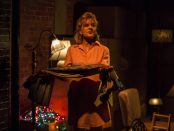[Porto]
Stop me if you’ve heard this one before: three people walk into a bar where they are known by the drinks they order. Only in Kate Benson’s new play "[Porto]," the unnamed bar is in a gentrified neighborhood in Brooklyn, and is defined as a “boushy bar,” a portmanteau word made up of "bourgeois" and "douchey." We know that because it serves “serious food, serious beer, serious wine, serious spirits.” And what of the story the play tells? Like an episode of "Seinfeld," 'Friends" or "Girls," it will probably please Millennials most, those who are living the life of spending evenings in trendy bars to find companionship. The second play this year following "Miles for Mary" to transfer from Brooklyn’s Bushwick Starr to Manhattan, [Porto] is now at the WP Theater for an Off Broadway run. [more]









